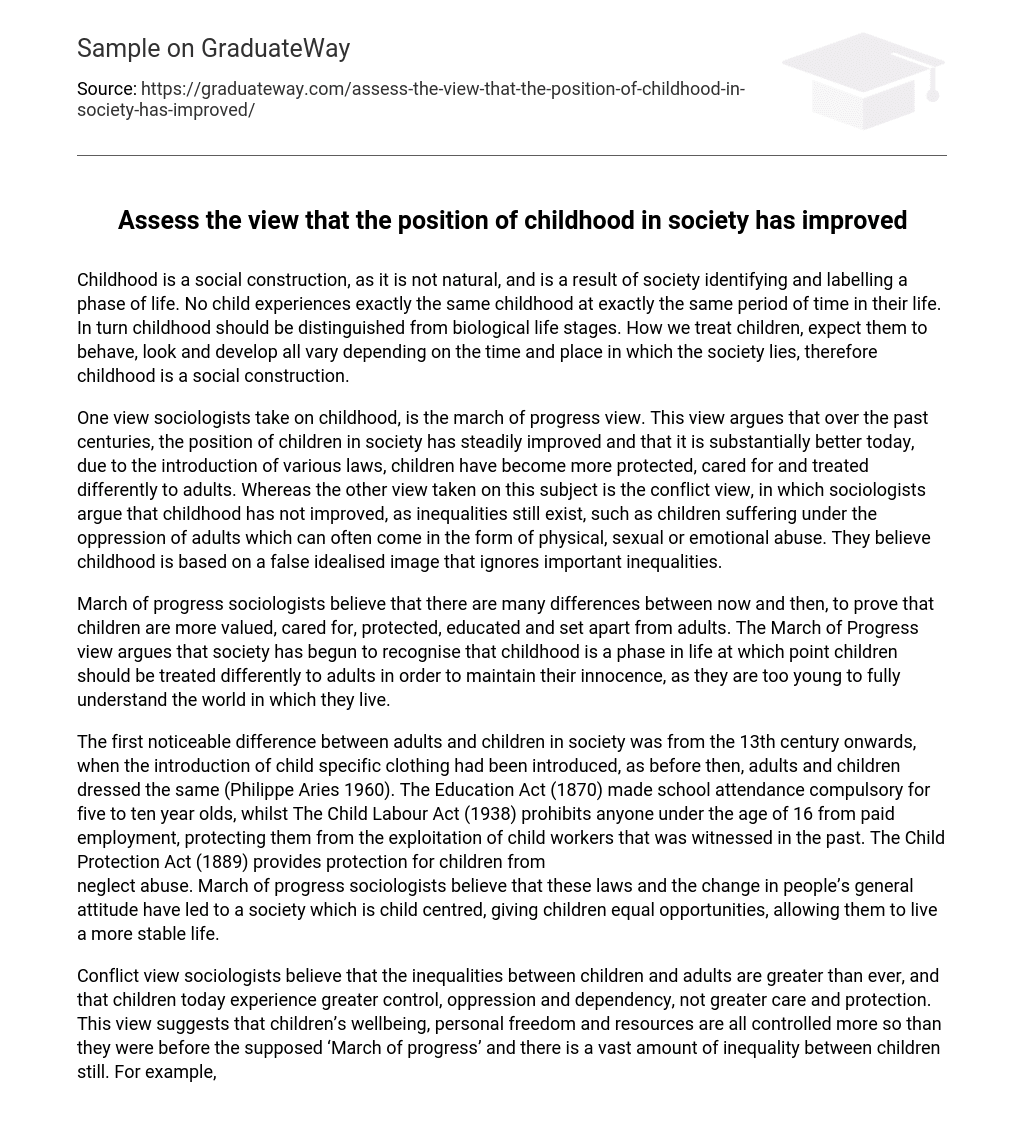Childhood is a social construct because it is not inherent and is instead a product of society labeling and defining a specific phase of life. Each child’s experience of childhood is unique and does not align exactly with others during the same timeframe. It is important to differentiate childhood from biological stages of life. The way children are treated, expected to behave, appear, and grow all differ based on the societal norms and values of a particular time and location. Hence, childhood is a social construct.
One perspective of sociologists regarding childhood is the “march of progress” view. According to this view, the status of children in society has progressively enhanced over the centuries. It contends that today, due to the implementation of various laws, children are better protected, cared for, and treated differently than adults. On the other hand, sociologists adopt the “conflict” view which argues that childhood has not truly improved. This perspective highlights the existence of inequalities, such as children being subjected to adult oppression, including physical, sexual, and emotional abuse. Sociologists who hold this position believe that the concept of childhood is built upon an idealized image that overlooks significant inequalities.
According to sociologists who adhere to the March of Progress perspective, there have been notable differences in how children were treated in the past compared to the present. These sociologists argue that children are now more esteemed, nurtured, safeguarded, educated, and kept separate from adults. This perspective asserts that society has increasingly acknowledged childhood as a distinct stage in life where children should be treated differently from adults in order to preserve their innocence given their limited comprehension of the world they inhabit.
The introduction of child-specific clothing in the 13th century marked a visible distinction between adults and children in society (Philippe Aries 1960). The Education Act (1870) mandated school attendance for children aged five to ten, while The Child Labour Act (1938) prohibited paid work for individuals below 16 years old, safeguarding them from exploitation. Additionally, The Child Protection Act (1889) implemented measures to protect children from neglect and abuse. These legislations, along with changing societal attitudes, have contributed to the establishment of a child-centered society that ensures equal opportunities and increased stability for children.
According to conflict view sociologists, children in the present experience more control, oppression, and dependency instead of increased care and protection. This creates disparities between children and adults. This perspective suggests that compared to the past ‘March of progress’, children’s well-being, personal freedom, and resources are now more regulated, resulting in significant inequalities among them. As an example, class differences contribute to this inequality as children from unskilled manual workers have over three times higher chances of having conduct disorders compared to those from professional backgrounds (Caroline Woodroffe 1993). Moreover, being born into impoverished families increases the likelihood of infant or childhood mortality (Marilyn Howard 2001).
Supporters of the March of Progress theory in sociology argue that there has been a shift towards focusing on children within families. Nowadays, children are seen as central to society and are involved in decision-making processes that were previously only done by adults. Parents not only invest financially in their children, but also emotionally. Additionally, parents often have higher hopes for their children’s achievements compared to what they themselves have accomplished. Furthermore, proponents of this theory assert that children not only hold a key position within families but also play a central role in society. This is evident through various leisure activities, media services, food products, and clothing items specifically targeted at the child market.
Conflict sociologists argue that not only class inequality but also control over freedom of space discriminates between children in society. They point out that the home habitat of an eight-year-old has shrunk to one ninth the size it was twenty-five years ago, as stated by Hugh Cunningham (2007). This reduction in space is seen as an example of the oppression that parents/guardians force upon children, putting them at a disadvantage compared to children from twenty-five years ago. Due to this limited space, they lack the same level of experience of the outside world. Moreover, conflict sociologists highlight the gender divide, stating that boys are more likely than girls to be allowed to use public transport and go out unaccompanied after dark, according to Mayer Hillman (1993). On the other hand, girls are found to do more domestic labor, particularly in lone parent families where they perform five times more domestic chores than boys, as mentioned by Jens Bonke (1999).
According to conflict sociologists Firestone & Holt (1979/1974), the improvement in children’s mental and physical wellbeing is evident. However, they argue that what march of progress sociologists perceive as progress in terms of care and protection is actually a disguised form of oppression and control. Nevertheless, it is important to note that parents hold the ultimate control over their children and some do deviate from this oppressive trend by offering their children the necessary responsibility, equality, and space while still providing care and protection.





